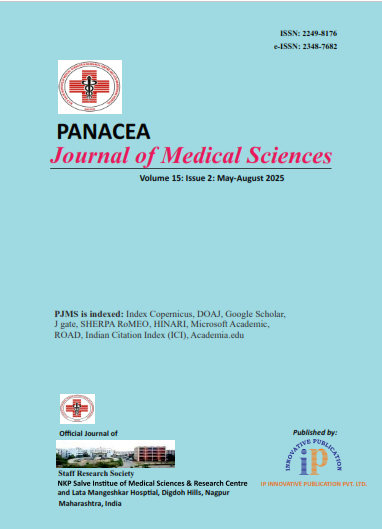Panacea Journal of Medical Sciences
Panacea Journal of Medical Sciences (PJMS) open access, peer-reviewed triannually journal publishing since 2011 and is published under auspices of the “NKP Salve Institute of Medical Sciences and Research Centre”. With the aim of faster and better dissemination of knowledge, we will be publishing the article ‘Ahead of Print’ immediately on acceptance. In addition, the journal would allow free access (Open Access) to its contents, which is likely to attract more readers and citations to articles published in PJMS.Manuscripts must be prepared in accordance with “Uniform requiremen...

A study of cognitive function, quality of sleep, and Stroop effect among adolescent girls with premenstrual syndrome
Page: 393-397
Background: Premenstrual syndrome (PMS) involves various somatic and psychological symptoms related to the luteal phase of the menstrual cycle, ranging from mild discomfort to disability and impacting daily life.
Objective: To compare cognitive function, sleep quality, and the Stroop effect between adolescent girls with PMS and healthy controls.
Materials and Methods: This cross-sectional study included 60 adolescent girls (30 with PMS and 30 controls) at the Department of Physiology, Government Thiruvarur Medical College. The participants were selected using the Premenstrual Symptoms Screening Tool (PSST). Cognitive function was assessed using the Montreal Cognitive Assessment (MoCA), sleep quality using the Pittsburgh Sleep Quality Index (PSQI), and attention processing using the Stroop effect. Measurements were taken three days before menstruation.
Results: The mean age was similar in both groups (PMS: 18.97 ± 0.81; controls: 18.93 ± 0.78). MoCA scores were significantly lower in the PMS group (23.9 ± 2.97) than the controls (25.93 ± 1.76, P < 0.05). PSQI scores were higher in the PMS group (6.67 ± 1.65 vs. 5.3 ± 1.3, P < 0.05), indicating poorer sleep quality. The Stroop effect duration was significantly shorter in the PMS group (48.67 ± 15.18) than in controls (66.7 ± 19.13, P < 0.05).
Conclusion: PMS significantly impairs cognitive function, sleep quality, and Stroop task performance in adolescent girls. Early recognition and intervention are crucial to mitigate these impacts on academic and daily activities.
Article Metrics
- Visibility 16 Views
- Downloads 5 Views
- DOI 10.18231/pjms.v.15.i.2.393-397
-
CrossMark
- Citation
- Received Date October 12, 2024
- Accepted Date December 30, 2024
- Publication Date August 19, 2025